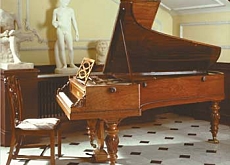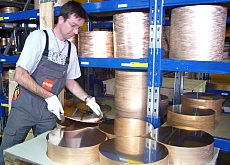Chopin piano find is music to owner’s ears

The grand piano Frederic Chopin took on his last concert tour has been found in an English country house - thanks to detective work by a Swiss musical scholar.
For more than 150 years after the composer’s death, Chopin’s piano vanished until Jean-Jacques Eigeldinger researched the ledgers of French piano maker Camille Pleyel.
“It came as a bolt from the blue,” said British collector Alec Cobbe after discovering that the piano he bought 20 years ago for £2,000 (SFr 4,764) is a piece of musical history.
Eigeldinger, who had met Cobbe at a Chopin conference, came to see the collector armed with details of where and to whom all the Pleyel pianos were sold.
Thanks to the manufacturer’s records, he was able to identify Cobbe’s piano as the one the Polish-born composer brought to Britain on a farewell tour in 1848.
“The pianos of the time had a serial number which was registered,” Eigeldinger told swissinfo. “It gives us information on when it was finished, to whom it was sold and for how much.”
But the scholar admits that certifying that Chopin used a particular instrument is more difficult.
“Chopin never bought his pianos; they were loaned to him by Pleyel because of the aura he lent to the instruments,” said Eigeldinger. “So a lot of pianos that we don’t know about probably passed through the composer’s hands.”
There are only few instruments in public collections that are identified as having been used by Chopin, with a number of others in private hands according to the music scholar.
Before leaving Britain to return to Paris after what turned out to be the last tour before Chopin’s death, the Pleyel was sold to an English aristocrat called Lady Trotter.
Bequeathed to one of her relatives, the piano ended up in a country mansion before being sent to auction and then sold to Cobbe by an antique piano dealer.
Hearing Chopin again
Chopin once remarked, “Pleyel pianos are the last word in perfection”. Now music fans are hoping to hear what the composer’s music would have actually sounded like in his own salon.
But Eigeldinger says that people shouldn’t get their hopes up.
“It depends very much on the quality of the piano’s restoration,” he told swissinfo. “The [Cobbe] piano is probably in better shape than others.”
According to the scholar, there is still much to learn about these instruments, in particular how they were built. However contemporary descriptions of the piano help understand how it might have sounded.
Franz Liszt, the other great 19th century pianist, said the Pleyels had a “silvery, slightly veiled sound and the keys had a soft feeling” – characteristics that probably appealed to Chopin, reckons Eigeldinger.
“Somebody who can hear that might get the impression that it’s Chopin’s sound,” he added. “But then everybody who heard Chopin play said you could no longer recognise the instrument he was using.”
swissinfo with agencies
Chopin’s piano is part of the Cobbe collection of musical instruments displayed at Hatchlands, a country house run by Britain’s National Trust in the southern English county of Surrey.
It is billed as the world’s finest music collection, boasting instruments owned or played by Purcell, Bach, Mozart and Mahler.
Frederic Chopin was born in 1810 in Poland to a Polish mother and French father. Considered a child prodigy, he left for Paris at the age of 20. There he made a career as a performer, teacher and composer. He died of tuberculosis aged 39.
All of Chopin’s existing work includes the piano in some role, and his compositions are widely considered to be among the pinnacles of the piano repertoire.
His music is technically demanding, but Chopin’s style also highlights poetry, nuance, and expressive depth.
His most significant innovations were within existing forms such as the piano sonata, waltz, nocturne, étude and prelude.

In compliance with the JTI standards
More: SWI swissinfo.ch certified by the Journalism Trust Initiative


You can find an overview of ongoing debates with our journalists here. Please join us!
If you want to start a conversation about a topic raised in this article or want to report factual errors, email us at english@swissinfo.ch.